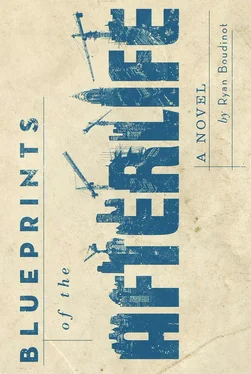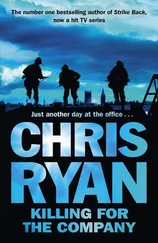All I know is—
You said it yourself, Luke. I have the transcript right here. Hold on… Where is it. Okay, here, “… it’s flattering to imagine that you’re so important that secret brotherhoods struggle over your fate…” But you fell for it, too. You let your imagination get the best of you with all this talk of aliens in hospital corridors. Imagining a postapocalyptic future is just a way to cope with your sense of being an outsider. Since you can’t fix the disappointments of your real life, you imagine a future life in which you’ve miraculously survived and are looked to as some sort of prophet. But this is all there is. All we have are roads, buildings, institutions, commerce, entertainment, governments, and jobs. This is the real world. There is no other world.
[…]
Okay, I didn’t mean to fly off the handle like that.
[…]
Can I get you something? A juice?
[…]
Look—
Why is the prophecy so threatening to you?
Threatening?
If what I’m saying is crazy, why have such an emotional reaction to it? Why not just dismiss me? Who’s crazy? I know what’s happening on the other side of that door. I can get online in this place. I read blogs. We’re at the dawn of a horrifying and hellish new era.
New era? What’s so new about it? When has the world not been fucked-up? Wasn’t it pretty fucked-up for the Jews in Auschwitz? Wasn’t it pretty fucked-up for the Africans on slave ships?
You have no—
Point to any era and I’ll show you pestilence, war, slavery, genocide. Even the supposed good times were tinged in darkness. There’s no such thing as a new era of fucked-up shit because the shit has always been fucked-up. Fucked-up is the nature of the shit. And yet somehow we endure it. And little by little life improves. Fewer women die in childbirth. Slavery is abolished. Children don’t have to work in factories anymore. Life expectancies increase—
Momentary illusions of—
Here’s a question for you: Why is it that when things were going relatively well for you, when you were making the big bucks in the dot-com bubble or just sort of retired and hanging out, getting stoned with your friends, that you seemed to lose interest in finding Nick, the academy, and Mr. Kirkpatrick? You only started believing in the Age of Fucked Up Shit after Nick shot you in Arizona—if, in fact, that’s what actually happened. Anytime things were going right for you, the future of the world seemed bright. Anytime they were going wrong, the imminent collapse of civilization was at hand. Can’t you see how thoroughly you projected your own subjective vision of reality on the world?
I’m done here.
I’m not trying to get into a fight. But I think we’ve reached a point in this conversation when we have to change the fundamental question. Instead of asking what kind of world you live in, it’s time to ask what kind of world you want.
[crying] [unintelligible]… too late for that.
It’s not, though, Luke. It’s entirely up to you. What kind of world can you imagine? A sick world of suffering? Or one of beauty and light? What’s it going to be?
[crying] I can’t.
Yes you can.
I can’t choose. I just have to [unintelligible] in Vegas.
What happened in Las Vegas?
Skinner clutched a shrub. The sky looked like a black-and-white photograph of scrambled eggs. Rivulets rushed down the gully’s pebbly slopes, forming little puddles that grew and merged and turned into pools. Skinner beat his legs to will them to move but they wouldn’t budge; the lower half of his body appeared to belong to a corpse. Soon a shallow pool rose around him. He strapped his backpack to the front of his body, stuffed three capped and empty water bottles inside, then waited until the water began to move before he let go of the shrub. At first it was like a child’s ride at a theme park, the old man bobbing along idiotically, squinting up at the rain hurtling into his face. He spit, cursed, coughed. The stream started moving faster, egged on by gathering volume and dropping elevation. Within an hour the formerly dry riverbed was coursing with water. Skinner, a tiny object flung along by the current, strained to keep his head up. An uprooted tree passed nearby, then bits of campsite garbage and a rodent riding a log. On either side of the waterway evergreens swayed and shook water from their boughs. Skinner shivered and chattered profanities. His head went under for a second before he surfaced long enough for a gasp to fill his lungs, then he was down again, scrubbed against the gravel riverbed, lifted up for more air as if the river was toying with him, prolonging his death. He grabbed the exposed root of a tree dangling in the water but couldn’t summon the strength to pull himself up and decided to let go. Let me be washed from this earth. He bobbed up onto his back and saw the sky, was flung sideways and upside down and caught glimpses of green and brown then was dunked into impossibly silent water for what appeared to be his final moments— Chiho Waitimu Roon— the water went black, then resolved to bluish green and in the shadowy depths he saw something moving: steel beams, some kind of machine. As his remaining breath dribbled from his nostrils he discovered that he was in a net, then sensed his body rising quickly to the surface. When he broke through he winced, sucked air, coughed. From above, a mechanical squeal. A leg-like thing moved in his periphery. The net rose above the surface of the water and now he saw that he was dangling from the underside of a multilimbed contraption, like a spider with the net hanging from its abdomen, its mechanically articulated hydraulic legs wobbling as the thing rose up to twenty feet tall. Eight of these legs came together at a central hub, a battered disc about the size of a compact car, from which the net swung. The machine stumbled drunkenly out of the river and onto the bank, then picked its way along a trail through trees reluctantly letting in the daylight. Skinner watched the forest floor beneath him: reddened cedar boughs and the occasional vine maple. Branches crackled around him as the robot awkwardly bumped against tree trunks and stumbled over exposed roots. A fir bough whacked Skinner in the face. The path widened and became a logging road, over which the mechanical beast moved with more confidence. Skinner smelled burning wood. The robot lurched in a new direction and entered a clearing. A little A-frame cabin stood with its roof covered completely in moss, smoke curling from the chimney. From inside came the sound of a stereo cranked full-volume, a sort of freak-out guitar solo interminably carving up sixteenth notes. The robot sighed and came to a halt. Skinner choked out a “Hello?”
A minute or so passed and the solo showed no sign of stopping. A naked man appeared. Looked to be about forty, grayish blackish hair pulled back in a ponytail. Skinny. Thick bifocal glasses. He tapped an elaborately carved walking stick on the mossy ground and stared at the net, slack-mouthed.
“Hello?” Skinner said again.
Keeping his eyes on the net, the man called out of the corner of his mouth, “Number 167! Hey, 167!”
When no one named Number 167 answered or arrived, the man cursed and walked to the door of the cabin, which he proceeded to beat with the stick. He paused, waited for 167 to appear, then beat the door even harder. Finally the song ended and the door opened a crack.
“167! There’s a corpse! In the net!”
What emerged from the cabin was a figure far more squat than the naked guy, wrapped in layers of flannel, denim, and quilted down, a stocking cap pulled low, his face puffy red and covered in whiskers, eyes open the width of hyphens.
Читать дальше












